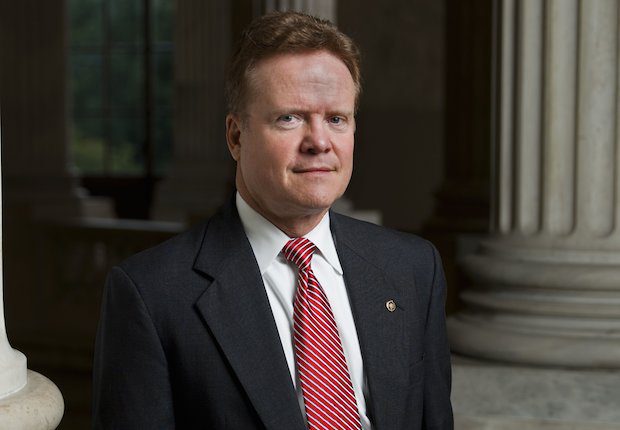James Webb, War Novelist

James Webb is the best politician-novelist since Brand Whitlock, the early 20th-century Ohio realist, mayor of Toledo, and protege of the sainted Tolstoyan Samuel “Golden Rule” Jones.
Whitlock was spoken of as a potential Democratic candidate for president; Webb, the much-decorated Vietnam vet, former secretary of the Navy, and ex-Virginia senator, is actively pursuing the nomination of a party whose brain trust consists largely of Ivy League contemners of the working-class whites whom author Webb has defended with eloquent ferocity.
His superb first novel, Fields of Fire (1978), follows into Vietnam a platoon of Marines led by Robert E. Lee Hodges, a young officer from hardscrabble Kentucky who hears ancestral voices as he fights not for the Domino Theory or Robert McNamara but “because we have always fought.”
Hodges’s unit includes an enlistee from Harvard, mockingly nicknamed “Senator,” a “pissant crybaby” who loses a leg yet gains a hard-won wisdom. Senator returns to school a “Real Live Wounded Vet, as rare at Harvard as a miner at a tea party.” Contrasting the mewling children of privilege with the hicks and soul brothers with whom he had served, Senator comes to understand that a “culture gap” dwarfs the generation gap or any other artificial barrier that divides Americans.
This culture gap, as well as his rank-and-file resentment of those warmongers who “had other priorities,” a la Dick Cheney, has been a consistent Webb theme.
In Something to Die For (1991), Webb’s bloodless villain is a defense secretary—a product of Harvard, naturally—who prissily disapproves of the photo of Nathan Bedford Forrest that decorates the office of the elderly Senate majority leader, a Mississippi populist who wants us to tend to our own affairs rather than go abroad to slay dragons.
The secretary, a cuckold who “didn’t have the guts to serve when there was a war on, and now every time there’s a crisis he wants to send them in,” engineers a U.S. intervention in Ethiopia to divert public attention from a scandal involving Japan. He is nicknamed Chicken Hawk by “the fighting troops of America,” among them Col. Bill Fogarty, who recalls of Vietnam: “I killed soldiers I did not hate, to fulfill the desires of politicians I did not love.”
As he tells in his recent campaign-ishly titled memoir I Heard My Country Calling, Jim Webb was an itinerant Air Force brat. A nomadic childhood often bodes ill for an adult’s ability to form attachments to people and places, but Webb proudly asserts his Appalachian roots.
In Born Fighting (2004), his treatment of his Scots-Irish heritage, Webb writes of obtaining Confederate headstones for ancestors buried atop a mountain near Alley Hollow, Virginia. As he stands near the graves he feels a rush of defiant pride: “The slurs stick to me … . Rednecks. Trailer-park trash. Racists. Cannon fodder. My ancestors. My people. Me.” 
Webb has exquisite taste, lauding Johnny Cash and Steve Earle and Vernon Parrington, the Oklahoma Sooners football coach and author of the populist-inflected literary history Main Currents in American Thought.
(The 2016 race may feature two candidates who share names with praiseworthy pop-music figures: Webb, whose distant cousin Jimmy Webb wrote the achingly beautiful antiwar song “Galveston,” among other hits, and Scott Walker, the public-union-busting Wisconsin governor whose appellative double is the teen idol turned eccentric minimalist who sang the lush masterpiece “The Sun Ain’t Gonna Shine Anymore”, only to walk away into his own world of night music.)
James Webb is hardly a pacifist, but next to Hillary Clinton he is a virtual Smedley Butler: the peace candidate, a sharp critic of our Middle Eastern entanglements and their architects.
The tired old categories need a reset. Webb, who praises the “Southern redneck” as “the greatest inhibitor of the plans of the activist Left and the cultural Marxists for a new kind of society,” will be the most powerful voice in his party for drug-law and prison reform, an end to promiscuous military interventions, and closing the chasm between the plutocracy and the rest of us.
Echoing the Populists of the 1890s, especially those who sought a biracial coalition against the exploiters and the imperialists, Webb denies that “America should be governed by a club of insiders who manipulate public opinion in order to serve the interests of hidden elites who hold the reins of power.”
Nothing he writes can be mistaken for a Martin O’Malley tweet or Heritage Foundation issue paper.
It is impossible to read Webb and conclude that he has anything but loathing for the Fortunate Sons—the Jeb Bushes and Mitt Romneys—and the epicene polemicists who do their masters’ bidding. If Webb gets anywhere near the White House, these un-American snipers will deploy, but Jim Webb has faced weaponry more potent than the chicken hawks’ pea-shooters—and he lived to tell the tale.
Bill Kauffman is the author of ten books, among them Dispatches from the Muckdog Gazette and Ain’t My America.